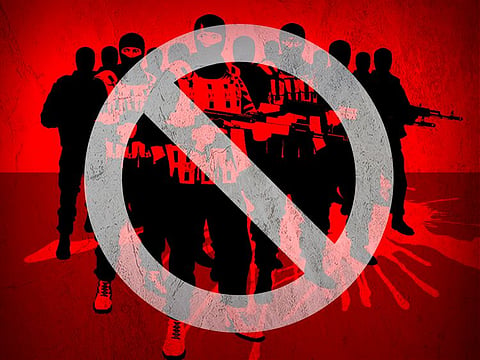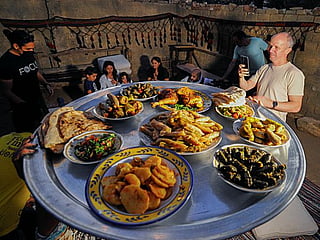Daesh: No place for evil ideology in civilised world
The terror outfit has become a persistent wrinkle in every discourse

What? There’s a lone wolf columnist out there intent on making Daesh, these days already a horse and buggy issue, a subject of his column?
Well, yes. We are well-timed this month to reflect, in the cold light of hindsight, on the malign legacy of the mock-up caliphate that Daesh had birthed in our region, given the fact that it was almost exactly six years ago, on May 14, 2015, that the group’s leader, Abu Bakr Al-Baghdadi, in an audio-taped message and in truculent language strangely at odds with his reedy voice, urged folks to “immigrate” to the “Islamic state” and “join the fight” in Iraq and Syria.
Roughly 40,000 aspiring caliphniks, pitiable souls from 81 countries — some accompanied by wives and children — answered the call.
It was as if there was a fatal attraction between the rapturous nihilism and primeval passions of the caliphate and the social alienation and emotional fragility of the caliphniks. Thus, Al-Baghdadi’s expansive invitation did not seem as comical then as it does today.
That year, keep in mind, Daesh was a movement at the peak of its power, holding under its control about a third of Syria and 40 per cent of Iraq.
Unspeakable brutalities
It also had been able to co-opt faith and in its name commit unspeakable brutalities, including the use of sexual violence as a weapon of war against ethno-religious minorities, the wanton destruction of precious heritage sites, mass murder and beheadings of captured foreign journalists, among other atrocities.
During its reign of terror, there was violence and yet more violence wherever it set foot. Gratuitous violence. Violence for the sake of violence. Violence inflicted on innocents with no expectation that it would achieve desired political ends.
Why? Questions crowd upon us as we recall, say, the day when, on November 23, 2017, affiliated califnicks, operating in northers Sinai, detonated a bomb inside a mosque and then sprayed gunfire on the panicked Sufi worshippers, many children among them, as they fled the carnage, killing 305 people.
The question that tormented us at the time was this: what demented political paradigm, or perhaps demons preying on the soul, would sanctify the belief that innocent, apolitical, working class folk praying in a mosque are legitimate targets for slaughter?
But we do not ask that question today because today we know that the constitution of caliphniks’ personality, by that time, had become so brutalised — and thus their guilt so neutralised — that they saw elemental allure in perpetrating that kind of violence — violence for its own sake.
But because it was too vile and scurrilous a movement to produce those charities of the imagination, which are essential to humane order, Daesh was doomed to have a short lifespan, its end nigh. Look, men who destroy what is in them of man and resurrect what had been of primeval beast cannot survive among other men who are humanely disposed.
And sure enough, by March 2019, the wretched caliphate had lost its entire territory, with caliphniks, holed up in their last stronghold in the town of Baghouz, finally routed into surrender.
Several months later, a mere five years after he announced the establishment of his worldwide caliphate — a claim to eminent domain universally rejected, where it was not dismissively ridiculed by the Muslim world — Abu Bakr Al-Baghdadi, the caliph of all caliphniks, was killed in a coalition air strike, outside a dusty village in the Euphrates River Valley, near the Syrian-Iraqi border.
Not unique to Arab history
The dragon had let out its last puff.
This saga is not a phenomenon unique to Arab history. Europe, for example, has had its own Abu Bakr Al-Baghdadi in the person of Thomas Muntzer, the German pastor and theologian who led a pan-European, scorched-earth peasant uprising in 1525, aimed at ushering in a New Eden on the continent; just as it has had its own Daesh, which came into being after the German Democratic Republic was transformed into the Third Reich in 1933, a vicious entity that ushered in the venomous ideology of Nazim.
It is a mystery why the modern history of our part of the world had hidden within it so nihilistic an inward fire as to produce a movement dominated by caliphniks who turned the good in their faith — much as, say, the Crusaders had done in theirs after they breached the walls of Jerusalem in 1099 — into evil, the compassionate into the merciless and the human into the beast.
What is not a mystery is that today the human community inhabits a global village, made of diverse societies that, at a seminal level, together are edging closer to the recognition that they share a common humanity. That tentatively dawning recognition by denizens of that village augurs well all around.
— Fawaz Turki is a journalist, academic and author based in Washington. He is the author of The Disinherited: Journal of a Palestinian Exile








